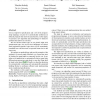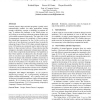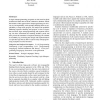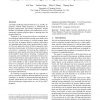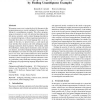OOPSLA
2010
Springer
13 years 10 months ago
2010
Springer
Given a high-level specification and a low-level programming language, our goal is to automatically synthesize an efficient program that meets the specification. In this paper,...
OOPSLA
2010
Springer
13 years 10 months ago
2010
Springer
Type classes were originally developed in Haskell as a disciplined alternative to ad-hoc polymorphism. Type classes have been shown to provide a type-safe solution to important ch...
OOPSLA
2010
Springer
13 years 10 months ago
2010
Springer
The Java language lacks the important notions of ownership (an object owns its representation to prevent unwanted aliasing) and immutability (the division into mutable, immutable,...
OOPSLA
2010
Springer
13 years 10 months ago
2010
Springer
Heterogeneous multi-core processors, such as the IBM Cell processor, can deliver high performance. However, these processors are notoriously difficult to program: different cores...
OOPSLA
2010
Springer
13 years 10 months ago
2010
Springer
General purpose object-oriented programs typically aren’t embarrassingly parallel. For these applications, finding enough concurrency remains a challenge in program design. To ...
OOPSLA
2010
Springer
13 years 10 months ago
2010
Springer
In logic metaprogramming, programs are not stored as plain textfiles but rather derived from a deductive database. While the benefits of this approach for metaprogramming are ob...
OOPSLA
2010
Springer
13 years 10 months ago
2010
Springer
Accurately predicting program behaviors (e.g., locality, dependency, method calling frequency) is fundamental for program optimizations and runtime adaptations. Despite decades of...
OOPSLA
2010
Springer
13 years 10 months ago
2010
Springer
Web sites and web browsers have recently evolved into platforms on top of which entire applications are delivered dynamically, mostly as JavaScript source code. This delivery form...
OOPSLA
2010
Springer
13 years 10 months ago
2010
Springer
OOPSLA
2010
Springer
13 years 10 months ago
2010
Springer
We propose a new way to raise the level of discourse in the programming process: permit ambiguity, but manage it by linking it to unambiguous examples. This allows programming env...
